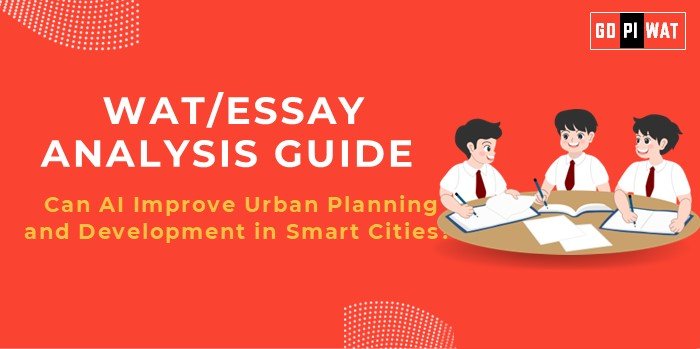📋 WAT/Essay Analysis Guide: Can AI Improve Urban Planning and Development in Smart Cities?
🌐 Understanding the Topic’s Importance
AI’s role in urban planning links directly to themes of sustainability, technology adoption, and governance—key areas of interest for B-school applicants.
📝 Effective Planning and Writing
- ⏳ Time Allocation (30 mins):
- Planning: 5 minutes
- Writing: 20 minutes
- Review: 5 minutes
- 📖 Structure:
- Introduction: 60-70 words
- Body: 350-375 words
- Conclusion: 60-70 words
✨ Introduction Techniques for Essays
- Contrast Approach:
- Solution-Based Approach:
“While cities like Singapore leverage AI to optimize traffic, others struggle with basic infrastructure—highlighting AI’s uneven impact.”
“AI holds the potential to revolutionize urban planning, offering sustainable solutions to modern challenges.”
📚 Structuring the Essay Body
- Achievements:
- Cite examples like AI reducing water wastage by 20% in Barcelona.
- Challenges:
- Highlight privacy concerns and the digital divide.
- Future Outlook:
- Discuss potential advancements like AI-driven disaster management.
🏁 Concluding Effectively
- Balanced Perspective: “AI is a game-changer for urban development, but its success hinges on ethical usage and equitable access.”
- Global Comparison: “Cities like Seoul and Singapore showcase AI’s potential, but global scalability remains a challenge.”
📈 Analyzing Successes and Shortcomings
- Key Achievements: Optimized traffic systems, improved energy management, reduced waste.
- Ongoing Challenges: Cybersecurity risks, infrastructure disparities.
- Global Context: Learnings from Estonia and Singapore.
💡 Recommendations for Sustainable Progress
- 📜 Establish ethical AI frameworks.
- 🤝 Foster global cooperation on AI governance.
- 🏗️ Invest in infrastructure for AI scalability.
✍️ Sample Short Essays
- Balanced Perspective:
- Solution-Oriented:
- Global Comparison:
“AI in urban planning is a double-edged sword—promising efficiency but requiring robust safeguards.”
“Integrating AI with IoT can transform urban living, addressing challenges like congestion and resource wastage.”
“From Seoul to Amsterdam, AI is reshaping cities, but equitable access remains critical for success.”


